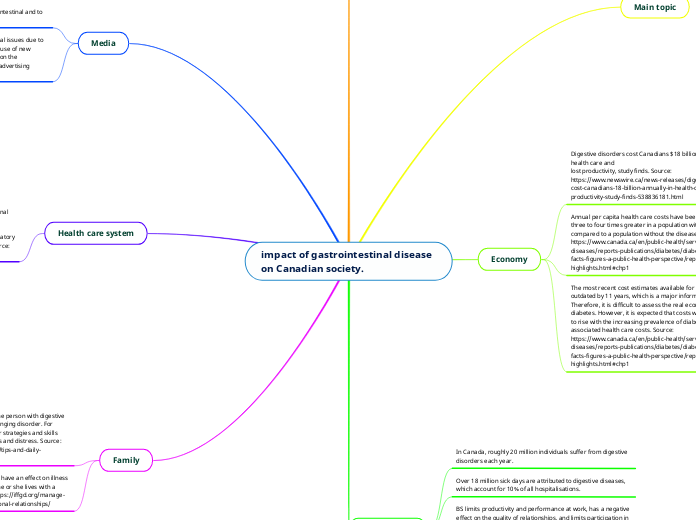impact of gastrointestinal disease on Canadian society.
Individual
igestive diseases interfere with digestion and other organ functions in a number of ways throughout the digestive tract. They can cause dehydration, poor absorption of nutrients, general weakness, headaches, fever, blocked blood flow, and other issues. Source: www.sharecare.com/health/digestive-diseases/how-digestive-diseases-affect-b…
Digestive diseases can also affect people's behaviors, emotions, and general functioning. Source: www.sharecare.com/health/digestive-diseases/how-digestive-diseases-affect-b…
Digestive diseases affect the body in different ways. Sometimes, intestines get damaged and stop working properly. This can be for all sorts of reasons. Some conditions stop the body from digesting food properly. Others block the intestines so food can’t get through. Source: https://www.sharecare.com/health/digestive-diseases/how-digestive-diseases-affect-body
people who suffer from Clostridium difficile have to wait at around 15 months to start eating a normal diet after the disease is gone or is healing.
Sometimes the walls of the intestines get damaged and leak. Any of these conditions are bad news for the body. It means it doesn’t get the nutrients it needs. Source: https://www.sharecare.com/health/digestive-diseases/how-digestive-diseases-affect-body
Individuals with lap band surgery can experience difficulties such as productive burp which is when the person is full and is a piece over the limit of the band causes the person to throw up making a difficult to eat and have a normal life.
Subtopic
Main topic
Economy
Digestive disorders cost Canadians $18 billion annually in health care and
lost productivity, study finds. Source: https://www.newswire.ca/news-releases/digestive-disorders-cost-canadians-18-billion-annually-in-health-care-andlost-productivity-study-finds-538836181.html
Annual per capita health care costs have been estimated to be three to four times greater in a population with diabetes compared to a population without the disease. Source: https://www.canada.ca/en/public-health/services/chronic-diseases/reports-publications/diabetes/diabetes-canada-facts-figures-a-public-health-perspective/report-highlights.html#chp1
In 2008/09, adults aged 20 to 49 years with diabetes saw a family physician twice as often as those without diabetes, and specialists two to three times more often. Source: https://www.canada.ca/en/public-health/services/chronic-diseases/reports-publications/diabetes/diabetes-canada-facts-figures-a-public-health-perspective/report-highlights.html#chp1
The most recent cost estimates available for this report are outdated by 11 years, which is a major information gap. Therefore, it is difficult to assess the real economic burden of diabetes. However, it is expected that costs will only continue to rise with the increasing prevalence of diabetes and its associated health care costs. Source: https://www.canada.ca/en/public-health/services/chronic-diseases/reports-publications/diabetes/diabetes-canada-facts-figures-a-public-health-perspective/report-highlights.html#chp1
Employment
In Canada, roughly 20 million individuals suffer from digestive disorders each year.
Over 18 million sick days are attributed to digestive diseases, which account for 10% of all hospitalisations.
BS limits productivity and performance at work, has a negative effect on the quality of relationships, and limits participation in routine social activity. Source: https://cdhf.ca/digestive-disorders/irritable-bowel-syndrome-ibs/what-is-irritable-bowel-syndrome-ibs/
Few of the studies have indicated that about one-third of the IBS patients miss out on the three days of work each year due to IBS symptoms, and more than 7% of the patients take about two weeks off from work each year. Depending on the severity of the symptoms, absenteeism from work varies for every individual. Source: ibsclinic.com/about-us/
Media
The media can promote awareness of gastrointestinal and to not be embarrassed to talk about it.
Many people have experienced gastrointestinal issues due to foods that contain barley, rye gluten etc. Because of new awareness of the negative effects these food on the gastrointestinal tract the media is cater their advertising towards people with gastrointestinal disease.
Health care system
In 2015, annual health care expenditures for gastrointestinal diseases totaled $135.9 billion. Hepatitis ($23.3 billion), esophageal disorders ($18.1 billion), biliary tract disease ($10.3 billion), abdominal pain ($10.2 billion), and inflammatory bowel disease ($7.2 billion) were the most expensive. Source: https://pubmed.ncbi.nlm.nih.gov/30315778
Individuals with diabetes were three times more likely to have been hospitalized at least once during the year than those without diabetes, and had a longer hospital stay.
Patients with Clostridium difficile have to isolate themselves from their families and friends to not infect them with the disease.
A positive impact of this disease would be that patients who have it later learn to be more hygienic when using the bathroom and wash hands thoroughly after being exposed to the bacteria.
Family
Recognizing the skills and strengths the person with digestive condition uses coping with their challenging disorder. For example, calling attention to his or her strategies and skills used in managing intestinal symptoms and distress. Source: https://iffgd.org/manage-your-health/tips-and-daily-living/personal-relationships/
One of the most common symptoms of IBS is in. According to studies of people with low-back pain, the association between a spouse's pain basic quality and a happy marriage may have positive impacts, but negative ones in an unhappy marriage.
Family and personal relationships can have an effect on illness and on how well a person will feel as he or she lives with a chronic digestive disorder. Source: https://iffgd.org/manage-your-health/tips-and-daily-living/personal-relationships/
